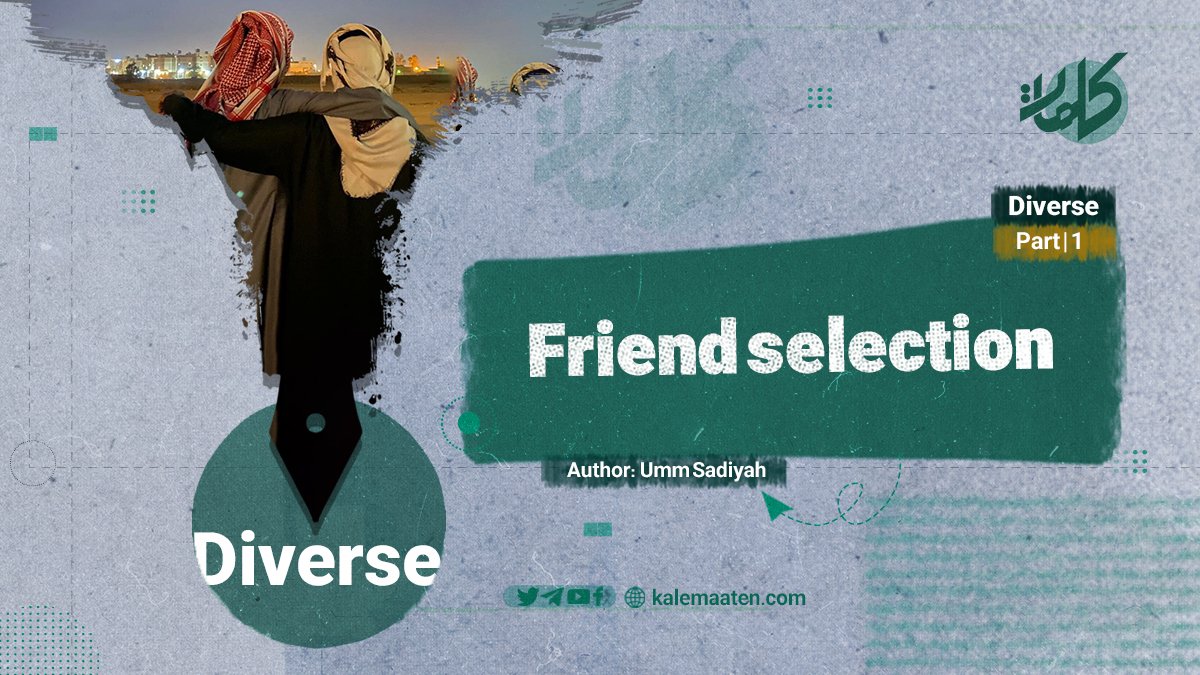Author: Umm Sadiyah
Friend Selection (Part One)
Abstract:
One of the most important factors in shaping human personality is friendship and social interaction. Since humans are inherently social beings, regardless of the society they live in, they naturally seek companions, friends, and associates. It is through loyal and sincere friends that an individual can climb the ladders of success and development, step by step. A friend often leads a person to the heights of honor and greatness, becoming a source of social blessings and benefits. Furthermore, it is within the environment of companionship and empathy that talents flourish, enabling humans to create inventions, discoveries, and lasting works that benefit society.
On the other hand, unworthy and wicked friends can drag a person into the mire of corruption, leading them to the brink of destruction and ruin. However, a Muslim, guided by the lamp of reason and the wisdom of thought, fulfills all their material and spiritual needs—including finding friends—through thoughtful planning. Such a person selects friends based on sound criteria, divine motivation, and for the sake of Allah. They understand that the only lasting friendships are those rooted in faith, as these relationships endure in both this world and the Hereafter. As the Almighty Allah says: «الأَخلاّءُ یَوْمَئِذٍ بَعْضُهُمْ لِبَعْضٍ عَدُوٌ إلاّ الْمِتَّقین» “On the Day of Judgment, all friends, except the pious, will be enemies of each other.”[1]
Introduction:
Associating with the good and the bad will impart good and bad effects on a person. Therefore, those interested in the health of their souls should be discerning when choosing friends, associates, and companions, as they may later regret their choices. Life is essentially a collection of relationships, acquaintances, friendships, and interactions. To navigate the path toward perfection, one requires a “companion.” The role of a companion is evident in shaping a person’s behavior, actions, and characteristics. The Quran advises: «کُونُوا مَعَ الصَّادِقِین» “Be with the truthful.” [2]
The “truthful” (صادقین) are individuals whose truthfulness is a value emphasized in the Qur’an. To nurture and strengthen honesty in believers, the Qur’an commands them to associate with the truthful. Recognizing the profound influence of role models on individual character and personality development, the Qur’an encourages following the examples of the righteous and highlights their positive attributes.
The most exemplary role model is the blessed presence of the Prophet Muhammad (peace and blessings be upon him), referred to in divine scripture as the “best example” (uswa hasana). Additionally, Prophet Ibrahim (Abraham), the Friend of Allah, is also mentioned as a role model. His exemplary traits include sincere worship of Allah, rejecting polytheism and its followers, and maintaining a firm distinction from those who do not believe in the Oneness of Allah.
For a believer, it is critical to consider whom they form friendships and alliances with and whom they choose to avoid. Can a Muslim befriend a disbeliever? Can a monotheist establish a friendship with a polytheist, a Satan-worshiper, or a hedonist? If a Muslim neglects the Qur’anic teachings and fails to be cautious about their companions, they risk falling into traps. Hence, the Qur’an states that true believers never form friendships or alliances with the enemies of Allah and His Messenger, nor do they seek solace and companionship in them: «لا تَجِدُ قَوْماً یؤْمِنُونَ بِاللَّهِ وَالْیوْمِ الْآخِرِ یوَادُّونَ مَنْ حَادَّ اللَّهَ وَرَسُولَهُ»
This is a step toward protecting one’s faith and preserving the identity of the Islamic school of thought. [3]
Thus, one must select their companions carefully, choosing friends and associates from the best, as associations—whether with the righteous or the corrupt, the obedient or the disobedient, the virtuous or the wicked—have inherent positive or negative effects on us. These impacts extend even into the Hereafter, where regret will be irreparable.
The Qur’an highlights the grief and sorrow of those who distance themselves from the prophets and friends of Allah while befriending wrongdoers. On the Day of Judgment, they will express their regret, saying: «یا لَیتَنِی اتَّخَذْتُ مَعَ الرَّسُولِ سَبِیلاً یا وَیلَتَی لَیتَنِی لَمْ أَتَّخِذْ فُلاناً خَلِیلاً» “If only I had taken the path of friendship with the Prophet! If only I had not chosen so-and-so as my friend!” [4]
Poets and literary figures have eloquently expressed the dangers of associating with bad companions, comparing a bad friend to a venomous snake—or even worse. While a snake may bite the body, a bad friend can destroy the soul and faith.
The seeds of regret in the Hereafter are often sown through poor choices in friendships made in this world. Engaging with bad companions through meaningless conversations, gossip, mockery, and inappropriate jokes may seem entertaining, yet they are adversaries to reason and faith.
Choosing a worthy friend and virtuous companion is a step toward avoiding frivolity and wasting one’s life. Those who seek true happiness do not attach themselves to careless or irresponsible friends but strive to distinguish between genuine friends and false ones.
As Saadi (may Allah have mercy on him) beautifully expressed:
“Your companion should be better than you,
So that they may increase your wisdom and faith.”
The aspiration of the faithful and their lofty prayer is to be in the company of the righteous, both in this world and the Hereafter. They even pray to leave this world alongside the virtuous and to be resurrected with them: «وَتَوَفَّنَا مَعَ الْأَبْرَارِ».[5]
Quranic education is based on following the best examples of human beings. When the happiness and misery of individuals depend significantly on their companions and associates, the choice of friends—be they partners, colleagues, classmates, teachers, traveling companions, or roommates—is crucial, as their moral virtues may transfer to us. Conversely, if they display moral defects, these flaws may contaminate us as well.
Continues…
[1] – Surah Az-Zukhruf, Verse: 67.
[2] – Surah At-Tawbah, Verse: 119.
[3] – Surah Al-Mujadila, Verse: 22.
[4] – Surah Al-Furqan, Verses: 27-28.
[5] – Surah Al-Imran, Verse: 193.



